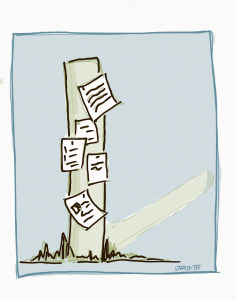 Lines of communication.
Lines of communication.
Exchanges back and forth.
Contact kept, contact lost and sometimes contact re-established.
So much of business is based on communication. Exchanging information between buyer and seller. The digital era has reduced human interaction considerably; online purchases involve only a few words and various clicks.
But in many businesses lines of communication are open and healthy – both internally and externally.
This post will explore the various expressions we have in English to describe how we keep up to date with the constant flows of information.
To keep someone posted
This expression means to keep someone up to date on the latest developments. Usually, though, if you say it or write it to someone, both sides know which subject you are referring to.
For example, if you’ve been discussing the potential outcome of a project, you’d write:
“Keep me posted.” [it would be understood by both sides that you were referring to the project]
If someone may need your help on a project awaiting a certain outcome, you can say:
“Keep me posted.”
You don’t just end an email with it – which is what a client did in an email to me the other day – unless it relates to some point in the email that has already been discussed.
To keep someone informed
Same meaning as above, but more formal. It is often used in relation to a series of decisions, or a decision-making process. It doesn’t just relate to a one-off thing/event.
For example:
“Please keep me informed of any developments/the latest progress.”
“Please keep me informed of your movements.”
OR
“I’ll keep you informed of my whereabouts.”
“I’ll check in regularly to keep you informed on the status of the project/business/process.”
To let someone know
This is the most informal of the three expressions and you are asking for a response to a specific question and usually in a one-off situation.
For example:
“Let me know how you get on at your interview.”
“Let me know what you think.” [Understood here is that both sides know what the writer is referring to]
“I’ll let you know as soon as we make a decision.”
“I’ll let you know how it all goes.”
To keep someone in the loop
A person can be in or out of the loop, which means they are aware or unaware of information shared by others.
For example:
“Why was I kept out of the loop?”
This would mean you were kept in the dark about a certain project and you’re not happy about it!
“I think it’s time to bring John into the loop as we’ll need his support on this.”
John now needs to know the subject under discussion and all will be revealed to him.
To keep someone in the loop means to keep a person up to date with any information concerning a specific subject.
In a company, perhaps a manager will delegate a project to a junior person, and she’ll say:
“You are responsible for this case now, but keep me in the loop.”
If someone has offered you work, dependent on certain decisions being taken, you can say:
“That sounds great. Please keep me in the loop.”
OR
“Just keep me in the loop and I’ll let you know if I can join the project.”
To keep in touch with someone // to stay in touch with someone
![]()
Recently a client wrote at the bottom of an email, “Keep in touch.” It made me smile as it was not the right thing to write – I wasn’t going anywhere – but I understood the idea behind it.
We would only end with “Keep in touch” if the person is leaving a company or moving away. We’re asking them not to lose contact with us, we’re not asking to be kept up to date on a project, which is how my client used it!
For example:
“Please stay in touch and let me know if you ever return to London.”
“Let’s stay in touch; our paths may cross again!”
Email endings
I’m a great believer in short, simple emails and I most often sign mine off with one of the following lines:
Let me know.
Speak soon.
Will be back in touch.
Keep your lines of communication open; a good communicator is popular with everyone!
—
Give me more!
If you always struggle to start and finish letters or emails, we offer this refresher:
Nostalgic for the days when writing letters and postcards was common place – we think you’ll enjoy: